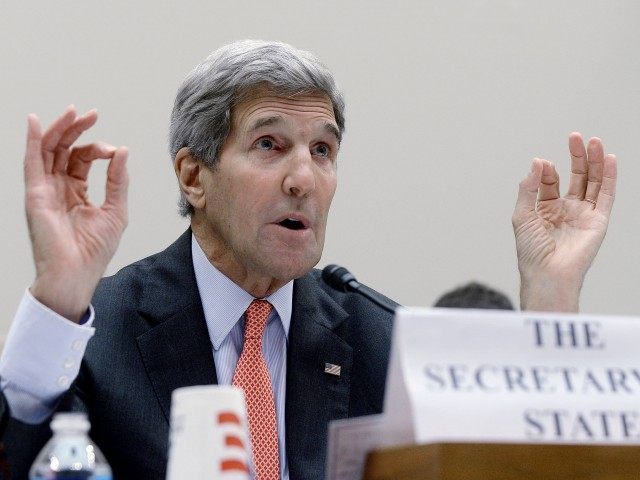Secretary of State John Kerry gave an interview to Jeffrey Goldberg of the Atlantic in which he warned Congress that if it rejected the Iran deal, it would “screw” the Iranian regime, and the Ayatollahs would not come back to the table.
“[T]he United States Congress will prove the ayatollah’s suspicion, and there’s no way he’s ever coming back. He will not come back to negotiate. Out of dignity, out of a suspicion that you can’t trust America. America is not going to negotiate in good faith. It didn’t negotiate in good faith now, would be his point,” Kerry said.
Kerry’s argument confirms the extent to which the Obama administration has become “Iran’s lawyer”–defending Iran’s behavior, adopting its perspective on negotiations, and above all negotiating as if America needed a deal more than the regime.
He warned that the “moderate” regime [sic] of Hassan Rouhani would fall if the deal were rejected, and be replaced by a more hard-line one (though it is difficult to point to any way in which Rouhani’s administration is less extremist and violent than its predecessors, except in its language on the global stage).
In layman’s terms, this is called “negotiating against yourself”–though some critics have begun to speculate openly that Obama wanted all along to boost one of America’s most determined enemies.
Goldberg, usually a reliable stenographer for an administration he supports, was skeptical of Kerry’s more far-fetched claims. When Kerry boasted that the Iran deal ” is as pro-Israel, as pro-Israel’s security, as it gets,” Goldberg pushed back. When Kerry claimed, falsely, that the U.S. intercepts weapons shipments to Hezbollah, Goldberg challenged him.
Kerry dismissed concerns–concerns once cited by Obama himself–that Iran’s breakout time to a nuclear weapon will shrink to near-zero after the deal expires in 10 or 15 years. The Secretary of State also cited Iran’s commitment to the Additional Protocol to the Non-Proliferation Treaty as proof that Iran would never build a nuclear weapon.
He did not mention that the Additional Protocol is voluntary, and that according to the text of the deal, it must be approved by the Iranian parliament first. (Goldberg did not challenge him on this point.)
Bizarrely, Kerry described Iran’s threats of “death to Israel” as “a fundamental ideological confrontation” between the two, as if it were a disagreement of principle rather than an explicit threat to “wipe Israel off the map” (Goldberg fills in the last three words, since Kerry is almost unwilling to say them). He also said that Iran’s cash windfall from sanctions relief would not help the Assad regime or regional terror groups much: “It’s not money that’s going to make a difference ultimately in what is happening,” Kerry told an evidently stunned Goldberg.
Kerry also repeated the administration’s claims that the sanctions effort was already collapsing–without noting that the administration had helped it collapse by dragging its feet.
Goldberg did not ask Kerry about why the administration circumvented Congress, or why it had not released Iran’s confidential deals with the International Atomic Energy Agency (IAEA). But his interview did confirm that Kerry, and the Obama administration, negotiated as if America were the weaker and more desperate party. The result is the bad deal America faces today.

COMMENTS
Please let us know if you're having issues with commenting.